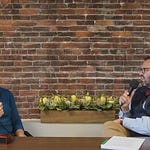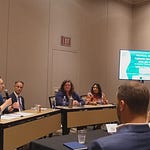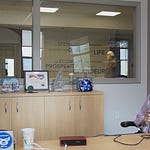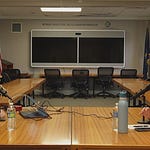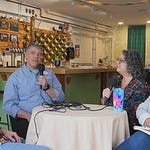On episode 37 of Granite Goodness Andy talks to Shemariah Blum-Evitts & Rachel Brice at Land For Good! The three discuss:
Land For Good's Mission: The nonprofit helps farmers access, manage, and transfer farmland through education, resources, and a land-linking platform to keep agricultural land active.
Challenges in Farmland Access: New farmers, often first-generation, face barriers like high land costs, lack of connections, and the aging farming population.
Collaborative Solutions: The organization promotes shared land use, creative agreements, and partnerships with nonprofits, universities, and government agencies to support farmers holistically.
Success Stories: Land For Good has helped farmers secure leases, expand operations, and access resources to grow their businesses sustainably.
Unique Expertise: As a farmland-focused organization working across six states, Land for Good combines regional insights with practical expertise from its farmer-staff members.
Optimism for the Future: Growing awareness of farmland access issues and increased advocacy provide hope for systematic change and sustainable agricultural practices.
and more!
Shemariah Blum-Evitts is the Executive Director and Rachel Brice is a Program and Development Manager at Land For Good. Land For Good’s mission is:
“…to expand secure farmland access, tenure, and transfer. We connect, assist, and engage farmers, landowners, service providers, communities, and policymakers to grow equitable farming opportunity and sustainably keep land in agriculture. We work across scales, from individual support to federal policy, to improve how farmers get onto, hold, and transfer farms.”
Links & Notes:
Land For Good’s incredible video about their impact
This episode was recorded at the Hannah Grimes Center for Entrepreneurship in Keene, NH
Music by the band Sneaky Miles
*For anyone watching, sorry if the lightning isn’t great- this was my first time at The Hannah Grimes Center and I didn’t realize how quickly the sunset would impact things! Thank you to Shema and Rachel for being accomodating and patient with me.
Instagram:
Linkedin:
Facebook:
Youtube:
AI Generated Episode Summary*
Can you share how you got involved with Land For Good and your ties to New Hampshire?
Rachel: I moved to New Hampshire in 2017 for graduate school and loved it so much I stayed, pursuing my PhD in environmental studies while also working at Land For Good. I’m now settled, with apple trees and honeybees.
Shema: I live in Massachusetts but grew up in Maine. I joined Land For Good six years ago. Our organization’s base in Keene is central to our work across New England.
What is Land For Good, and what does it aim to accomplish?
Shema: We’re a nonprofit helping farmers access, manage, and transfer farmland. We educate farmers, assist with strategies, and provide resources. Our land-linking website connects landowners with prospective farmers to maintain agricultural land.
Rachel: The work began with succession planning but has expanded to help new farmers overcome challenges like skyrocketing land costs.
Why is farmland access critical, and what challenges does it face?
Shema: There’s a disconnect between older farmers looking to sell their land and first-generation farmers seeking it. Economic pressures, climate change, and the high cost of land add complexity.
Rachel: Many entering farmers lack connections, making it harder for them to find opportunities compared to those with agricultural family legacies.
How does Land For Good address the limited nature of land?
Shema: We emphasize collaboration, like shared use of land or infrastructure. Options like leases and cooperatives can ensure land remains in agriculture while meeting diverse goals.
Rachel: Education and advocacy are crucial. We stress the importance of preserving farmland for community resilience and food security.
What partnerships does Land For Good rely on?
Shema: We collaborate with nonprofits, universities, land trusts, and government agencies to provide comprehensive support. For instance, a farmer may need both land and financial advice.
Rachel: We also seek professionals like attorneys to strengthen networks for agricultural sustainability.
Can you share success stories from your work?
Rachel: A course participant used our training to secure a greenhouse lease fitting their business plan. Another urban farm expanded with help navigating lease agreements.
Shema: We’ve compiled more such stories on our website, showcasing real-life impacts.
What’s unique about your organization?
Shema: Farmland access is our sole focus, which sets us apart. Working across six states allows us to share innovative ideas regionally and nationally.
Rachel: Our team includes farmers, bringing practical expertise to the table.
What advice do you give to those wanting to purchase farmland?
Shema: It’s not just about buying property; you need to assess infrastructure, zoning, and finances. We guide farmers in making informed decisions to avoid costly mistakes.
Rachel: For example, proper leases are critical to ensuring security and long-term success.
What lessons have you learned from your time at Land For Good?
Shema: The work is complex and long-term. It requires patience and understanding that progress happens incrementally.
Rachel: I’d tell my past self to join sooner. The relationships we build now lay the groundwork for future collaborations.
What gives you hope for the future of farmland access?
Rachel: It’s inspiring to see people’s commitment to sustainable agriculture and the collaborative energy within the community.
Shema: Farmland access is now a recognized issue, with support from programs like the USDA. There’s momentum for meaningful change.
*This episode summary was generated by an AI analyzing a transcript of the interview. The questions, wording, and written meaning of particular sections may contain slight differences to the original conversation. We include these summaries to give listeners a brief, readable synopsis of the episode. The full episode transcript is available on granitegoodness.com.






